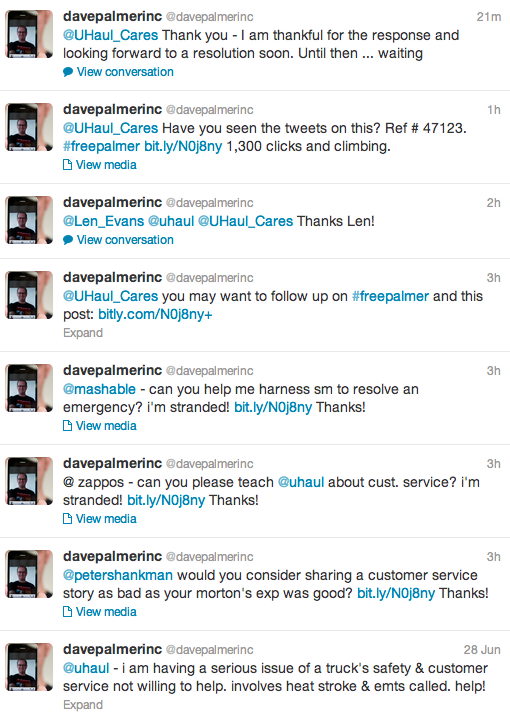“Them”, meaning “your staff”.
Are they using your policies and training as a shield to protect your business, or are they using them as tools and leverage to protect your customers and your brand?
There’s a big difference between the two. An example is this story involving a repeatedly broken-down U-Haul truck, whose details quickly spread across Twitter, Facebook and blogs.
You can see things ratchet up here (the tweets are listed in reverse chronological order, 21m means “21 minutes ago”, 3h means “3 hours ago”):

If some of those names don’t mean much, consider that:
- @Mashable reaches almost 3 million people via Twitter and millions more in the business and tech world via retweets and Mashable.com.
- @petershankman reaches 140k people on Twitter and has an email list full of journalists, authors, bloggers and PR people waiting for his HARO emails several times a day (HARO – Help-a-Reporter-Out)

After social media pressure started to heat up, U-Haul finally spoke up on day three with this (which you see Dave’s response to at “21m”, above):

Defending the brand
I’m sure that Dave and his dad will be cared for. What about the several hundred thousand people (according to HashTracking.com) who have seen this? Will it be what pops into their head the next time moving related topics are on their mind? That certainly isn’t what U-Haul wants. Will Dave, his friends and family ever use U-Haul again?
Is this what would happen if your business had a problem with someone who knows how to enlist help like this?
Things break. People make mistakes. Customers generally understand. They’re cranky when it happens because it’s unexpected change, discomfort and challenge, but their reaction depends on how you respond.
Your staff’s character and training determine how they implement your policies – and whether the situation becomes the next feel good story (or customer service nightmare) that your customers talk about on Facebook, Twitter and to their friends and family.
Character, Training and Policy
Reputation damage prevention comes down to character, training and policy implementation because you can’t always be there. There’s little doubt in my mind that U-Haul CEO Joe Shoen would have taken care of this properly – just like you would.
But Joe isn’t the one answering the phone.
He has managers and call centers handling that. Initially, it appears they did little to assure Dave that they had his back even though (or because) this drama took place in the region near U-Haul’s Phoenix corporate headquarters. Efforts to defend their business damaged their reputation – by design, but not by intent.
By design means we train our employees to defend our business, but we seldom empower them to defend its brand.
Why? We want to be the one making the decision when money is spent or time is committed to resolve a problem. We believe that no one would make the same decision we would because the staff isn’t spending their money.
The problem is that we aren’t always around when these decisions are needed, so we make policy. Policies produce consistent handling of daily operations, a good thing.
We often provide our staff with policy that encourages non-responsibility (“It’s our policy” and “There’s nothing else I can do”) combined with job insecurity (“violating policy is a termination offense”). This prevents your staff from doing the right thing when the unusual occurs.
For edge cases requiring conscientious thought, our policies are often silent. They rarely say “If use of this policy could damage our reputation, do what you think is best for the customer if the short-term cost to the company is less than (whatever), otherwise ask for approval of your resolution.”
And that’s where U-Haul is right now, both at the corporate customer support level and sadly, at a few franchises in the U.S. Southwest. Franchisees have just as much ability to damage the brand as HQ does.
It’s OK to train your staff to defend the business, but be sure they’re empowered and trained to defend your reputation as well.
Want to learn more about Mark or ask him to write about a strategic, operations or marketing problem? See Mark’s site, contact him on Twitter, or email him at [email protected].